Baseball Hitting Case Study: Why This Won’t Work…
Baseball Hitting Case Study: Cole Watts – 17-years-old
Cole’s dad Matt contacted me about setting up two in-person 45-minute lessons with a break between. They were coming from the Bay Area, which is about a 2.5 hours drive from me. Cole had been getting instruction from a Mike Epstein certified instructor, and they both have been following my video blog.
According to dad, Cole’s results were hitting the ball hard into the ground, and at-best, a low level line drive. In Cole’s baseball hitting case study, we’ll analyze:
- Challenges faced,
- Differences achieved after two sessions, and
- How we trained…
Challenges Faced…
First, Cole is tall, 6 foot, 3 inches, and growing. Being so tall, a hitter like him will be facing a “pitch plane” dilemma. CLICK HERE to watch video analysis comparing 6’3″ Adam Jones to 6’2″ Victor Martinez, and how to fix Jones’s above average strikeout and ground-ball percentages.
When I hear a player is taller and having trouble driving the ball consistently, I look at how efficient they’re getting the barrel level on a downward pitch plane. Are they:
- Making an aggressive move towards the pitcher (Un-weighting Principal)?
- Getting shorter (or lower) in the Fight Position (using Gravitational Forces)?
- Staying short through impact and finish (Adam Jones’s problem)? And, are they
- Loading the spring correctly?
Differences Achieved AFTER Two Sessions
After our baseball hitting sessions, here’s where Cole made some changes:
- Gaining stride distance – committing body weight to front leg,
- Getting lower into Fight Position – flexing front knee more at landing,
- Body lag – opening lower half at Fight Position & blocking his shoulders.
Benefits…#1 will give Cole more bat speed and allow his head to stay still during the Final Turn. #2 will empower Gravitational Forces to amplify Cole’s pelvic turn. #3 will naturally spring load his body (body lag) to transfer more energy into the baseball. The one thing we weren’t able to fix – in our short time together – was staying shorter through his impact and finish.
How We Trained…
How we train is just as important as what we’re training…if not more! At the end of our baseball hitting sessions, our 5-swing rounds consisted of training one mechanical variable with three mechanical constants. Defined…
- Mechanical Variable – if we’re working “showing the numbers”, then on odd swings 1, 3, and 5 we show the numbers. On swings 2 & 4 we don’t.
- Mechanical Constant – if we’re working on “showing the numbers”, then this is done on ALL 5 swings.
I call each mechanical piece, a layer. We start simple with one layer, which by itself becomes a variable. As we add another layer, then the old one becomes a constant, while the one added is the next variable. This is called interleaving. Only one variable layer at a time. The rest will be constants. Here were his layers, using the fine Art of Variance:
- Stretching his stride out beyond his “gamer” front marker,
- Landing shorter with committed body-weight,
- “Flashlight” on middle front thigh, open towards the pitcher,
- Showing (or “blocking”) his numbers longer.
We sandwich the wrong mechanic with the right one, so the brain can note the difference. If Cole wanted repeatable power, then hitting “tall” on the pitch plane wouldn’t work. He made so much progress in a short amount of time. Keep working hard kid!
- Fix Late Swings Fast: 2025 Pitch Recognition & See-Decide-Swing Training for Youth Baseball Power Hitters - October 6, 2025
- Safe Youth Weighted Bat Training: Proven Overload/Underload Drills to Increase Exit Velocity in Games Starting Tonight - September 29, 2025
- AI Coaching Course 2025: Youth Baseball & Softball Practice Plan + Off-Season & In-Season Workout Builder Fast - September 23, 2025

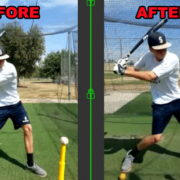
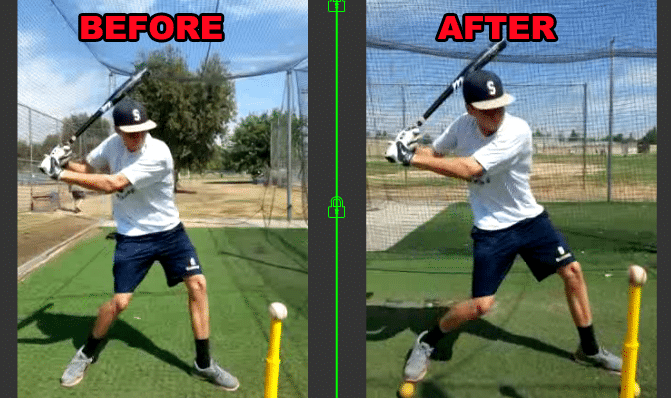
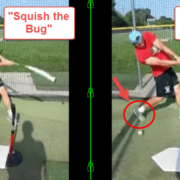
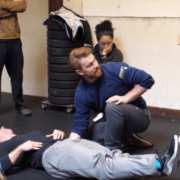
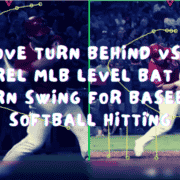
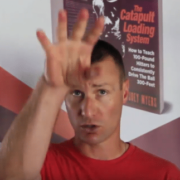


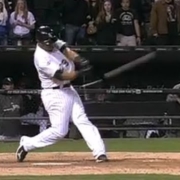



Bitchin’ Joey! Thanks for working with Cole! We will be back for more tweeks for sure!
You got it Matt! It was a pleasure working with Cole. Keep the eyes focused on these things and Cole will be seeing some changes to his outcomes for sure. Keep in touch with updates 🙂
My advice to Cole would be … If Joey says to do it … do it. If he says to stop doing it … then stop. Take his suggestions, and before you know it you’ll be dropping them out where they don’t cut the grass.
Thanks Bob! I love that, “hitting them where they don’t cut the grass” 😛
I have a similar situation with my 14 year old….Joey I watch your videos all the time but would love to get your help…My son is 6′ and is trying as hard as he can to demolish every worm around the plate. He has always been one of the better hitters on his team but over the last year he has just been pounding the baseball into the ground i.e. hard ground balls and low level line drives and we cannot correct…Thanks Chris from Long Beach, CA
Chris, I think this post will help your tall 14 year old too. He’s probably suffering from the same challenges as Cole was. Just not getting on pitch plane. Let me know if you have any questions about the training section of the post. Thanks for sharing!